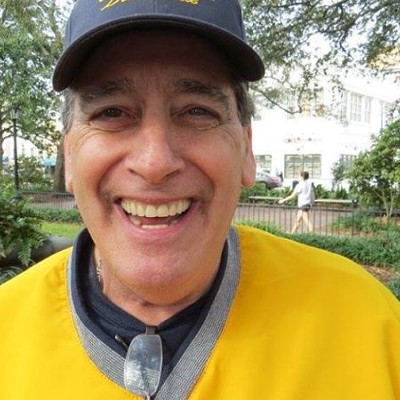I'LL NEVER forget Super Bowl Sunday, 2011.
It’s not so much the Packers’ ultimate domination over the Steelers or the nasal-searing spice of the chicken wings that I remember. It was more spending the second half in the emergency room with my daughter, who had cartwheeled off some nearby monkey bars and turned the bones in her left arm into a jigsaw puzzle.
We could have spent a couple of months flushing Benjamins down the toilet in Fiji for the same price as the surgery and resulting titanium rods in our 6-year-old’s ulna. Instead, we got to spend one luxurious night at Memorial Hospital (the food’s not great, but there’s free cable and ice chips.) We’ve been writing a monthly check ever since.
But send up hosannas and break out the bubbly, ‘cause this month—after faithful installments for almost five years—we have finally paid off the bill.
Am I bitter? No way. At least hospital billing departments don’t charge interest. And I remain eternally grateful for the expertise and bedside manners of the nurses, anesthesiologists and especially pediatric orthopedic surgeon Dr. Chetan Deshpande for putting our little Humpty Dumpty back together again. (Although I think Dr. Deshpande may have put something bionic in there. Trust me, you do not want to play Punch Buggy with this girl.)
Maybe it’s the champagne talking, but I might be even a smidgen optimistic about the state of American healthcare.
Sure, we still die younger than and spend more on over-prescribed pharmaceuticals than almost every other developed country. Our infant mortality rate remains tragically high, and there’s still an alarming one in 68 children on the autism spectrum and rising.
But new research suggests our eating and exercise habits are improving (though not necessarily among the poor.) More of us than ever have access to basic emergency and wellness care that won’t cut into the mortgage payment, thanks to the Affordable Care Act. No, the marketplace is nowhere near as perfect as Ariana Grande’s nose job, but it’s been a plod in the right direction.
Also promising is that America may finally have a new Surgeon General: After more than a year of rudderless public health policy during Ebola, antibiotic-resistant monster bacteria and whatever STD R. Kelly is spreading these days, word on Capitol Hill is that approval for the brilliant Dr. Vivek Murthy might come this month—right before the new Congress kicks in and starts playing Jenga with the ACA.
The Senate had contracted a terrible case of hem-and-haw over Dr. Murthy’s 2013 nomination, questioning the experience of the 38 year-old Yale- and Harvard-trained physician with extensive public heath credentials. But the real hold-up appears to be the galling suggestion made by Dr. Murthy that guns are a public health concern.
“Tired of politicians playing politics w/ guns, putting lives at risk b/c they’re scared of NRA,” he tweeted in October 2012. “Guns are a health care issue.”
Look, no matter how you feel about the Second Amendment, the fact remains that bullets kill or maim more than a 100,000 people a year and cost more than $2 billion in hospital charges. There’s no place for politics in the emergency room, and this country needs a Surgeon General who isn’t afraid to confront the partisan lobbying clogging up the bedpans rather than some quack in scrubs waving a box of Band-Aids and some fake diet pills. (You seemed like such a nice man, Dr. Oz!)
This sentiment is echoed by my brother, Dr. Ara Feinstein, who also happens to be a Yale-trained trauma surgeon with an extra degree in Public Health (maybe his presidential nomination got lost in the mail?) My bro has sutured up more than his share of gore, and his favorite droll advice to impart to his niece and nephew since they were knee-high to a sharp-cornered coffee table has been this: “The best way to avoid the ER is to stay away from guns, motorcycles and trampolines. And alcohol.”
Perhaps the biggest boost to my ameliorated attitude about the state of American medicine came a few weeks ago at the Georgia Medical Society’s annual Health Care Heroes Awards. Dozens of local doctors, nurses, hospice workers and health providers received honors, including my father-in-law, Dr. Harvey Lebos, who has spent the last four decades treating cancer patients, many of them indigent, as a hematologist/oncologist for Summit Cancer Care. (He was out of town, so we did our best to accept his award without our signature family awkwardness. Does wresting the microphone away from emcee Sonny Dixon count as embarrassing?)
The Georgia Medical Society is the oldest chartered medical society in the U.S., and I admit I kind of expected a whole lot of dusty rhetoric about the death of the profitable medical practice. I couldn’t have been more wrong, though I did overhear someone drop a reference to the “War of Northern Aggression” with a straight face.
The Society’s actually been riding the edge of community medicine for over 200 years, offering organized and progressive responses to public health crises from yellow fever to AIDS. Its doctors continue to serve rural communities and the poor, and many are advocating to expand Medicaid in Georgia as dictated by the ACA, thus far asphyxiated by Gov. Nathan Deal.
Such impressive efforts allowed me to overlook the irony of serving delicious but cholesterol-laden fried chicken at a healthcare banquet. Maybe we’ll work on some quinoa and kale for next year.
A more enlightened overall healthcare climate was certainly foreshadowed by keynote speaker Dr. T. Philip Malan, the dean of Mercer University School of Medicine.
“We’re getting away from the illness model of disease,” said Dr. Malan, underscoring more focus on prevention as well as a “practice what you preach” program of self-care for doctors and nurses. (How about a ‘scrip for pharmaceutical reps to bring healthy snacks instead of barbecue when they come to shill?)
Dr. Malan also acknowledged the incorporation of systems theory and information science that helps practitioners track medicine contraindications and may soon allow patients to access their own electronic medical records, a revolutionary and empowering development for anyone who’s ever had to wait for biopsy results over a weekend.
By far the most radical trend in healthcare lies at the level of medical education. America is facing a major doctor deficit, and Dr. Malan proudly explained that our local medical school is above the curve in recruiting homegrown students and keeping them in Georgia.
Our future doctors still get trained in the essentials, but there’s more emphasis on social science and human ethics as well as cross-cultural sensitivity. For all of our robotic surgeries and colonoscopy cameras, it turns out a good bedside manner may be one of the most valuable medical tools of all.
So as we dial down another open enrollment process, it seems to me that America could be loosening itself ever so slightly from the muscular tetanic grip of the pharma-insurance-government complex.
If we need any more help, I know a little girl who’s ready to arm wrestle.



























